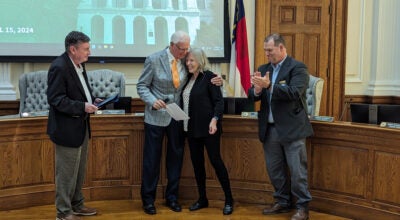Published 12:00 am Friday, October 18, 2013
Megane Barela longed for a simple everyday item some people take for granted — a bed. She recently got her wish as she’s become the first to stay in Capstone Recovery Center’s transitional housing program.
The nonprofit, which is a faith-based transitional substance abuse recovery program for women, gave Barela, 29, a place to lay her head at night.
The New Mexico native just completed the Jobs for Life program, an eight-week training course operated and offered through Capstone Recovery Center. The jobs program uses the Bible as a textbook and is designed to help the participant with pre-employment preparation, job search and business etiquette.
Center Director Miriam Ramirez established Capstone Recovery Center after seeing so many women relapse into past abuse behaviors because they had nowhere to go after leaving treatment facilities.
The Center will have a ribbon-cutting ceremony today at 10 a.m.
Ramirez’s husband, Oscar, has a doctorate in psychology and specializes in substance abuse.
He provides individual and group counseling at the Center, located at the former Sacred Heart Catholic Church offices, 418 W. Innes St. There are also other counselors who volunteer their services.
Barela moved to North Carolina in 2008 with the promise of a job. However, when she arrived, the job was not available. Barela found herself homeless and struggling to overcome substance abuse. She stayed at Rowan Helping Ministries for a year.
She said she has maintained sobriety and is learning to cope without such substances.
“I feel like I’m in a better place,” Barela said.
She’s enrolled into Livingstone College’s culinary arts program and has begun taking her basic core courses. Barela learned to cook from her grandmother, Lupe Chavez, who taught a young Barela to make chicken enchiladas.
Barela loved her grandmother’s cooking and wanted to cook just like her. Grandmother and granddaughter would cook meals together. Barela was raised early on by her grandmother and was eventually adopted when she was 5. In March 2003, Barela’s grandmother died.
Her goal is to become a chef and one day own her own restaurant. For the time being, Barela is happy to have a home with a kitchen so she can cook.
Barela said her grandmother was always in her corner and would be proud of her accomplishments.
“She’d be happy because I would be one of the first ones to graduate high school and go to college,” she said.
Ramirez expects three more program participants will stay in the transitional house. There are four stages of the program — gratitude and humility, identity and stability, consistency and endurance and fruitfulness and volunteering in the community.
Each stage, she said, depends on the person and can take 90 days to complete. Once participants complete a stage, they move to a different room and eventually, a bigger room.
To be apart of the program, individuals must be 18 years old, a non-smoker, have already obtained sobriety and have a desire to lead a new life, Ramirez said.
Barela isn’t completely alone in the house, since a house mother has volunteered to be there. But Ramirez hopes the Center can find someone who would be able to be there full time.
For more information about Capstone Recovery Center, visit the website at www.capstonerecoverycenter.org or search Facebook.com for Capstone Recovery Center.
Contact reporter Shavonne Potts at 704-797-4253. Twitter: www.twitter.com/salpostpotts Facebook: www.facebook.com/Shavonne.SalisburyPost.




